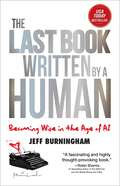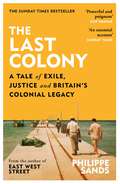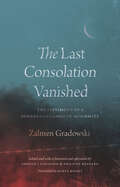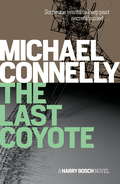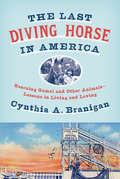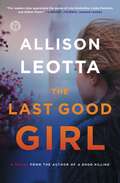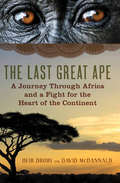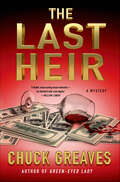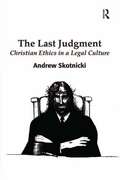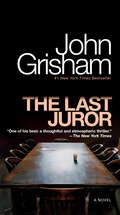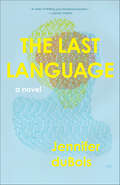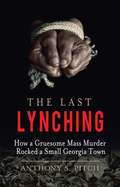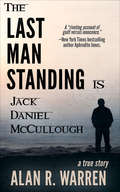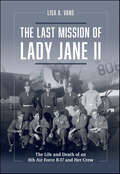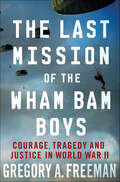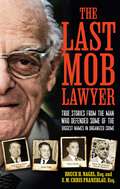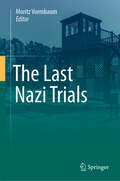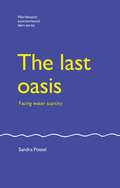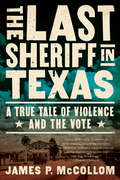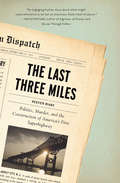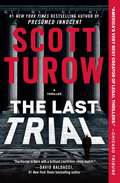- Table View
- List View
The Last Book Written by a Human: Becoming Wise in the Age of AI
by Jeff BurninghamIn The Last Book Written by a Human, tech entrepreneur Jeff Burningham delivers a profound and urgent exploration of what it truly means to be human in the age of AI—challenging us to embrace wisdom, love, and deep human connection as we navigate an uncertain future alongside machines."A refreshingly optimistic look at the possibilities of human-AI interaction." --Kirkus ReviewsWhat does it mean to be human? At a time when AI is rapidly changing the way we live, work, and think, this may be the biggest question we face. In The Last Book Written by a Human, tech entrepreneur and investor Jeff Burningham wrestles with the fundamental questions of existence, the future role of artificial intelligence in society, and the increasingly complex union between humanity and its creations. With raw honesty, Burningham shares his personal story from Mormon missionary and Bishop to successful entrepreneur to his gubernatorial run and beyond, offering reflections on our otherworldly potential and uncertain future in the age of AI. His call to action is clear: As machines become smarter, we must become wiser. You will discover: * How the rise of AI is forcing humanity to confront fundamental questions about consciousness, intelligence, and what it means to be truly human. * Why the development of AI must be guided by love, wisdom, and compassion. * How to navigate relationships in the future, ensuring we maintain genuine human connection alongside increasingly synthetic ones. * The importance of reforming institutions—religious, governmental, and business—to support human flourishing. * The cosmic necessity of mastering your life as a human being, rather than a human doing. This book is a wake-up call for our species to evolve beyond our unconscious patterns, false beliefs, and outdated systems in order to thrive in the age of AI.
The Last Colony: A Tale of Exile, Justice and Britain’s Colonial Legacy
by Philippe SandsFROM THE WINNER OF THE BAILIE GIFFORD PRIZETHE INSTANT SUNDAY TIMES BESTSELLER 'Should be read by anyone who cares about justice, humanity and human rights' Elif Shafak'An essential account' Sunday Times'Powerful and persuasive . . . superb' Abdulrazak Gurnah 'An urgent reminder that Britain's colonial rule isn't our past. It's our present' New Statesman'An important [book]' Observer'Elegant, moving and profoundly informative' The ScotsmanThrough one woman's fight for justice, the award-winning author of East West Street exposes the shocking events that marked the 1965 establishment of the British Indian Ocean Territory. Written with Sands' characteristic expertise, insight and thrilling storytelling, The Last Colony lays bare the brutal legacy of colonial rule, the devastating impact of Britain's grip on its last colony in Africa and the ongoing struggle to right a historic wrong.
The Last Consolation Vanished: The Testimony of a Sonderkommando in Auschwitz
by Zalmen GradowskiA first-person Holocaust account by a prisoner killed in Auschwitz: “An act of witness that rises now and then to Biblical heights of eloquence.” —J. M. Coetzee, Nobel Prize–winning authorFilling a gap in history, The Last Consolation Vanished is the first complete English translation and critical edition of one prisoner’s powerful account of life and death in Auschwitz, written in Yiddish and buried in the ashes near Crematorium III. Zalmen Gradowski was in the Sonderkommando (special squad) at Auschwitz, a Jewish prisoner given the unthinkable task of ushering Jewish deportees into the gas chambers, removing their bodies, salvaging any valuables, transporting their corpses to the crematoria, and destroying all evidence of their murders. Despite their impossible situation, many Sonderkommandos chose to resist in two interlaced ways: planning an uprising and testifying. Gradowski did both, by helping to lead a rebellion on October 7, 1944, and by documenting his experiences. Within 120 scrawled notebook pages, his accounts describe the process of the Holocaust, the relentless brutality of the Nazi regime, the assassination of Czech Jews, the relationships among the community of men forced to assist in this nightmare, and the unbearable separation and death of entire families, including his own. Amid daily unimaginable atrocities, he somehow wrote pages that were literary, sometimes even lyrical—hidden where and when one would least expect to find them. The October 7th rebellion was completely crushed and Gradowski was killed in the process, but his testimony lives on. His extraordinary and moving account, accompanied by a foreword and afterword by Philippe Mesnard and Arnold I. Davidson, is a voice speaking to us from the past on behalf of millions who were silenced. Their story must be shared.
The Last Coyote (Harry Bosch Series #4)
by Michael ConnellyLAPD detective Harry Bosch is down on his luck - his house is condemned in the aftermath of the earthquake, his girlfriend has left him and he has been suspended for attacking his superior officer. To occupy time, he examines the old case files covering a murder which took place on October 28, 1961. The victim was Marjorie Phillips Lowe - his mother . . .The case forces Bosch to confront the demons of the past, and as he digs deeper into the case, he discovers a trail of cover-ups that lead to the high-ups in the Hollywood Hills . . .
The Last Day, The Last Hour
by Robert J. SharpeOn 11 November 1918, the last day of the Great War, the Canadian Corps, led by Sir Arthur Currie, liberated Mons after four years of German occupation. The push to Mons in the last days and weeks of the war had cost many lives. Long after the war, Currie was blamed by many for needlessly wasting those lives. When the Port Hope Evening Guide published an editorial in 1927 repeating this charge, Currie was incensed. Against the advice of his friends, he decided to sue for libel and retained W.N. Tilley, Q.C., the leading lawyer of the day, to plead his case.First published in 1988, The Last Day, the Last Hour reconstructs the events - military and legal - that led to the trial and the trial itself, one of the most sensational courtroom battles in Canadian history, involving many prominent legal, military and political figures of the 1920s. Now back in print with a new preface by the author, judge and legal scholar Robert J. Sharpe, The Last Day, the Last Hour remains the definitive account of a landmark legal case.
The Last Days of Night: A Novel
by Graham MooreA thrilling novel based on actual events, about the nature of genius, the cost of ambition, and the battle to electrify America--from the Oscar-winning screenwriter of The Imitation Game and New York Times bestselling author of The SherlockianSOON TO BE A MAJOR MOTION PICTURE STARRING EDDIE REDMAYNE New York, 1888. Gas lamps still flicker in the city streets, but the miracle of electric light is in its infancy. The person who controls the means to turn night into day will make history--and a vast fortune. A young untested lawyer named Paul Cravath, fresh out of Columbia Law School, takes a case that seems impossible to win. Paul's client, George Westinghouse, has been sued by Thomas Edison over a billion-dollar question: Who invented the light bulb and holds the right to power the country? The case affords Paul entry to the heady world of high society--the glittering parties in Gramercy Park mansions, and the more insidious dealings done behind closed doors. The task facing him is beyond daunting. Edison is a wily, dangerous opponent with vast resources at his disposal--private spies, newspapers in his pocket, and the backing of J. P. Morgan himself. Yet this unknown lawyer shares with his famous adversary a compulsion to win at all costs. How will he do it? In obsessive pursuit of victory, Paul crosses paths with Nikola Tesla, an eccentric, brilliant inventor who may hold the key to defeating Edison, and with Agnes Huntington, a beautiful opera singer who proves to be a flawless performer on stage and off. As Paul takes greater and greater risks, he'll find that everyone in his path is playing their own game, and no one is quite who they seem.Advance praise for The Last Days of Night "Mesmerizing, clever, and absolutely crackling, The Last Days of Night is a triumph of imagination. Graham Moore has chosen Gilded Age New York as his playground, with outsized characters--Edison, Tesla, Westinghouse--as his players. The result is a beautifully researched, endlessly entertaining novel that will leave you buzzing."--Gillian Flynn, author of Gone Girl "In The Last Days of Night, Graham Moore takes us back to the dawn of light--electric light--into a world of invention and skulduggery, populated by the likes of Edison, Westinghouse, Tesla, and the novel's hero, a young lawyer named Paul Cravath (a name that will resonate with ambitious law students everywhere). It's part legal thriller, part tour of a magical time--the age of wonder--and once you've finished it, you'll find it hard to return to the world of now."--Erik Larson, author of The Devil in the White City "The Last Days of Night is a wonder, a riveting historical novel that is part legal thriller, part techno-suspense. This fast-paced story about the personal and legal clash over the invention of the light bulb is a tale of larger-than-life characters and devious doings, and a significant meditation on the price we as a society pay for new technology. . . . Thoughtful and hugely entertaining."--Scott TurowFrom the Hardcover edition.
The Last Diving Horse in America: Rescuing Gamal and Other Animals--Lessons in Living and Loving
by Cynthia A. BraniganThe rescue of the last diving horse in America and the inspiring story of how horse and animal rescuer were each profoundly transformed by the other—from the award-winning animal rescuer of retired racing greyhounds and author of the best-selling Adopting the Racing Greyhound It was the signature of Atlantic City&’s Steel Pier in the golden age of &“America&’s Favorite Playground&”: Doc Carver&’s High Diving Horses. Beginning in 1929, four times a day, seven days a week, a trained horse wearing only a harness ran up a ramp, a diving girl in a bathing suit and helmet jumped onto its mighty bare back, and together they sailed forty feet through the air, plunging, to thunderous applause, into a ten-foot-deep tank of water. Decades later, after cries of animal abuse and changing times, the act was shuttered, and in May 1980, the last Atlantic City Steel Pier diving horse was placed on the auction block in Indian Mills, New Jersey. The author, who had seen the act as a child and had been haunted by it, was now working with Cleveland Amory, the founding father of the modern animal protection movement, and she was, at the last minute, sent on a rescue mission: bidding for the horse everyone had come to buy, some for the slaughterhouse (they dropped out when the bidding exceeded his weight). The author&’s winning bid: $2,600—and Gamal, gleaming-coated, majestic, commanding, was hers; she who knew almost nothing about horses was now the owner of the last diving horse in America. Cynthia Branigan tells the magical, transformative story of how horse and new owner (who is trying to sort out her own life, feeling somewhat lost herself and in need of rescuing) come to know each other, educate each other, and teach each other important lessons of living and loving. She writes of providing a new home for Gamal, a farm with plentiful fields of rich, grazing pasture; of how Gamal, at age twenty-six, blossoms in his new circumstances; and of the special bond that slowly grows and deepens between them, as Gamal tests the author and grows to trust her, and as she grows to rely upon him as friend, confidant, teacher. She writes of her search for Gamal&’s past: moved from barn to barn, from barrel racer to rodeo horse, and ending up on the Steel Pier; how his resilience and dignity throughout those years give deep meaning to his life; and how in understanding this, the author is freed from her own past, which had been filled with doubts and fears and darkness. Branigan writes of the history of diving horses and of how rescuing and caring for Gamal led to her saving other animals—burros, llamas, and goats—first as company for Gamal and then finding homes for them all; and, finally, saving a ten-year-old retired greyhound called King—despondent, nearly broken in spirit—who, running free in the fields with Gamal, comes back to his happy self and opens up for the author a whole new surprising but purposeful world. A captivating tale of the power of animals and the love that can heal the heart and restore the soul.
The Last Good Girl: A Novel (Anna Curtis Series #5)
by Allison LeottaFrom Allison Leotta, the "highly entertaining storyteller" (George Pelecanos) who writes "in a style that's as real as it gets" (USA TODAY), a ripped-from-the-headlines novel featuring prosecutor Anna Curtis at the center of a national story involving campus rape and the disappearance of a young woman.It was her word against his...until she disappeared. Emily Shapiro has gone missing. A freshman at a Michigan university, Emily was last seen leaving a bar near Beta Psi, a prestigious and secretive fraternity. The main suspect is Dylan Highsmith, the son of one of the most powerful politicians in the state. At first, the only clue is pieced-together surveillance footage of Emily leaving the bar that night...and Dylan running down the street after her. When prosecutor Anna Curtis discovers a video diary Emily kept during her first few months at college, it exposes the history Emily had with Dylan: she accused him of rape before disappearing. Anna is horrified to discover that Dylan's frat is known on campus as the "rape factory." The case soon gets media attention and support from Title IX activists across the country, but Anna's investigation hits a wall. Anna has to find something, anything she can use to discover Emily alive. But without a body or any physical evidence, she's under threat from people who tell her to stop before she ruins the name of an innocent young man. Inspired by real-life stories, The Last Good Girl shines a light on campus rape and the powerful emotional dynamics that affect the families of the men and women on both sides.
The Last Great Ape: A Journey Through Africa and a Fight for the Heart of the Continent
by Ofir Drori David McdannaldAn epic journey through Africa by a man who fell in love with a magical and disappearing world and then transformed himself into a warrior on the frontline to protect it. Staging heart-pounding, espionage-style raids, Ofir Drori and his organization, The Last Great Ape (LAGA), have put countless poachers and traffickers of endangered species behind bars, and they have fought back against a Kafkaesque culture of corruption. Before Ofir arrived in Cameroon, no one had ever even tried.The Last Great Ape follows a young Ofir on fantastical adventures as he crosses remote African lands by camel, on a horse, and in dug-out canoes, while living with exotic tribes and struggling against nature at its rawest: charging elephants and hyenas, flash floods, and the need to eat river algae and snails to stay alive. The story moves from places of extreme beauty to those of the darkest horror: the war zones of Sierra Leone and Liberia. Ofir begins to work as a photojournalist in order to expose his shocking encounter with war victims and child soldiers. His experiences forge in him a resolution to become an activist and to fight for justice.The search for a cause eventually leads him to Cameroon. When Ofir discovers that no one is fighting to disprove Jane Goodall's dark prophesy that apes in the wild will be extinct in twenty years, he decides that he is the man to step in; because he knows he can make a difference, he sees it as his responsibility. And LAGA is born.The Last Great Ape is a story of the fight against extinction and the tragedy of endangered worlds, not just of animals but of people struggling to hold onto their culture. This book reveals the intense beauty and strife that exist side by side in Africa, and Ofir makes the case that activism and dedication to a cause are still relevant in a cynical modern world. This dangerous and dramatic story is one of courage and hope and, most importantly, a search for meaning.
The Last Heir: A Mystery (The Jack MacTaggart Mysteries #3)
by Chuck GreavesAn L.A. attorney finds family secrets, betrayal, greed, and murder in Napa Valley in this mystery by the author of Green-Eyed Lady.Philippe Giroux, estimable patriarch of the Château Giroux wine empire, has tragically lost a son. Or has he? Once confirmed by the court, Alain Giroux’s death will pave the way for his brother Phil to inherit America’s most storied winery. Or will it? Andy Clarkson, Alain’s boyhood chum, covets the Château Giroux vineyard acreage for his neighboring golf resort. Or does he? Claudia Giroux, Philippe’s hauntingly beautiful daughter, has proof that Alain’s death may not have been all that it seems. Or does she?As the scions of a privileged California wine dynasty grapple for control of their family’s legacy, attorney Jack MacTaggart is caught in a crossfire of estrangement, betrayal, and murder. To complicate matters, Jack is being shadowed by film star Ethan Scott, who hopes to spin the dross of a family’s private travails into box-office gold.Amid the stately oaks and sylvan vineyards of California’s fabled Napa Valley, Jack learns the hard way that while blood may be thicker than water, money is a powerful anticoagulant. As the long-buried secrets of a troubled family are finally revealed, only one question remains to be answered: Who will survive to become the Last Heir?Praise for The Last Heir“If you think a case with so few suspects will be simple, think again. Very few readers will be able to identify the last heir.” —Kirkus Reviews“A gripping look at a world where great resources and the best intentions can go horribly wrong.” —Booklist
The Last Judgment: Christian Ethics in a Legal Culture
by Andrew SkotnickiIn a culture obsessed with law, judgment, and violence, this book challenges Christians to remember that Jesus urged his followers to judge no one, bring harm upon no one, and follow no law save the law of altruistic love. It traces Christian history first to show that Christians of an earlier age took very seriously the gospel injunctions against punitive legal judgment and then how the advent of formal legal codes and philosophical dualism undermined that perspective to create a division between a private Christian spirituality and a public morality of order and legally sanctioned violence. This historical approach is accompanied by an argument that the recovery of a Christian ethic based upon unconditional love and forgiveness cannot be accomplished without the renewal of a Christian spirituality that mirrors the contemplative spirituality of Jesus.
The Last Juror
by John GrishamIn 1970, one of Mississippi's more colorful weekly newspapers, The Ford County Times, went bankrupt. To the surprise and dismay of many, ownership was assumed by a 23 year-old college dropout, named Willie Traynor. The future of the paper looked grim until a young mother was brutally raped and murdered by a member of the notorious Padgitt family. Willie Traynor reported all the gruesome details, and his newspaper began to prosper.The murderer, Danny Padgitt, was tried before a packed courthouse in Clanton, Mississippi. The trial came to a startling and dramatic end when the defendant threatened revenge against the jurors if they convicted him. Nevertheless, they found him guilty, and he was sentenced to life in prison.But in Mississippi in 1970, "life" didn't necessarily mean "life," and nine years later Danny Padgitt managed to get himself paroled. He returned to Ford County, and the retribution began.(P)2004 Random House, LLC
The Last Juror: A Novel (Pearson English Active Readers Ser.)
by John Grisham#1 NEW YORK TIMES BEST SELLER • In 1970, Willie Traynor comes to Clanton, Mississippi, in a Triumph Spitfire and a fog of vague ambitions. Within a year, the twenty-three-year-old finds himself the owner of Ford County&’s only newspaper, famous for its well-crafted obituaries. While the rest of America is in the grips of turmoil, Clanton lives on the edge of another age—until the brutal murder of a young mother rocks the town and thrusts Willie into the center of a storm.Daring to report the true horrors of the crime, Willie makes as many friends as enemies in Clanton, and over the next decade he sometimes wonders how he got there in the first place. But he can never escape the crime that shattered his innocence or the criminal whose evil left an indelible stain. Because as the ghosts of the South&’s past gather around Willie, as tension swirls around Clanton, men and women who served on a jury nine years ago are starting to die one by one—as a killer exacts the ultimate revenge.Don&’t miss John Grisham&’s new book, THE EXCHANGE: AFTER THE FIRM!
The Last Language: A Novel
by Jennifer duBoisFrom Jennifer duBois, “one of a handful of living American novelists who can comprehend both the long arc of history and the minute details that animate it” (Karan Mahajan) and “a writer of thrilling psychological precision” (Justin Torres), comes a spellbinding new novel.A few months after the death of her husband, Angela is ejected from her doctoral program in linguistics at Harvard University. Spinning and raw, and with few other options, the young widow and her four-year-old daughter move into her mother’s house in Medford, Massachusetts.Trained with an understanding of spoken language as the essential foundation of thought, Angela finds underpaid work at the Center, a fledgling organization that is developing an experimental therapy aimed at helping nonverbal patients with motor impairments. Through the Center, Angela begins to work closely with Sam, a twenty-seven-year-old patient who has been confined to his bedroom for the majority of his life. Following some faltering steps, Sam takes to the technology, proving to be not just literate but literary, and charming. Angela is initially stunned, then drawn intensely to Sam, and they develop an intimate relationship.When their secret is discovered, Sam’s family intervenes and brings charges. As Angela tells her story in the form of an unrepentant plea addressed from prison to her beloved, we are plunged into a Nabokovian hall of mirrors in which it is hard to know whom or what to believe. Is this a haunting story of doomed love, a manipulative account of pitiful self-delusion, or, as the state has charged, a criminal assault of a victim who doesn’t have the agency or intelligence required of a willing participant in a love affair?Provocative and profound in its exploration of what makes us human, this is an extraordinary novel from one of our most acclaimed contemporary writers.
The Last Lynching: How a Gruesome Mass Murder Rocked a Small Georgia Town
by Anthony S. PitchNothing casts a more sinister shadow over our nation’s history than the gruesome lynchings that happened between 1882 and 1937, claiming 4,680 victims. Often, in a show of racist violence, the lynchers tortured their victims before murdering them. Most killers were never brought to justice; some were instead celebrated as heroes, their victims’ bodies displayed, or even cut up and distributed, as trophies. Then, in 1946, the dead bodies of two men and two women were found near Moore’s Ford Bridge in rural Monroe, Georgia. Their killers were never identified. And although the crime reverberated through the troubled community, the corrupt courts, and eventually the whole world, many details remained unexplored ? until now. In The Last Lynching, Anthony S. Pitch reveals the true story behind the last mass lynching in America in unprecedented detail. Drawing on some 10,000 previously classified documents from the FBI and National Archives, Lynched paints an unflinching picture of the lives of the victims, suspects, and eyewitnesses, and describes the political, judicial, and socioeconomic conditions that stood in the way of justice. Along the way, The Last Lynching sheds light into a dark corner of American history which no one can afford to ignore. Skyhorse Publishing, as well as our Arcade imprint, are proud to publish a broad range of books for readers interested in history—books about World War II, the Third Reich, Hitler and his henchmen, the JFK assassination, conspiracies, the American Civil War, the American Revolution, gladiators, Vikings, ancient Rome, medieval times, the old West, and much more. While not every title we publish becomes a New York Times bestseller or a national bestseller, we are committed to books on subjects that are sometimes overlooked and to authors whose work might not otherwise find a home.
The Last Man Standing: Is Jack Daniel McCullough
by Alan R. WarrenA &“riveting account of guilt versus innocence&” from the bestselling author and host of the true crime radio show House of Mystery (Aphrodite Jones, New York Times bestselling author). It was a shattering death bed confession by a heartbroken mother. But would it solve the oldest cold case murder case in American jurisprudence? In January 1994, Eileen Tessier told Jack McCullough&’s half-sister Janet Tessier that he, her son, kidnapped 7-year-old Maria Ridulph from their neighborhood in Sycamore, Illinois, and killed her in December 1957. It was a case that tore the child&’s family apart, as well as dividing and terrifying the town as the days, then the months, and finally the years passed with no arrest. In 2008 the Illinois State police reopened the case against Jack after receiving an email from Janet Tessier about their mother&’s deathbed confession. After the Illinois State police interviewed Janet and learned that Jack had also been accused of raping their other sister, Jeanne Tessier, they reopened the case. But would reopening the case solve the question of who killed Maria Ridulph? And was McCullough the killer? In The Last Man Standing, true crime author Alan Warren writes in exacting detail about the kidnapping, murder and subsequent investigations—both in 1957 and 2008—that eventually led to the murder conviction of Jack McCullough. But the story doesn&’t stop there as it delves into the years McCullough spent in prison and the efforts to have his conviction overturned. Was McCullough the brutal killer of a little girl? Or was he the last man standing when the justice system decided he needed to pay for the crime? You decide.
The Last Mission of Lady Jane II: The Life and Death of an 8th Air Force B-17 and Her Crew
by Lisa A. VansFurther insight into the experience for 8th Air Force bomber crews over Germany, and in German captivity. New revelations about the investigation of the murder of several American bomber crewmen by German civilians. Learn personal stories about the crewmen of Lady Jane II, including the postwar struggles of the survivors.
The Last Mission of the Wham Bam Boys: Courage, Tragedy and Justice in World War II
by Gregory A. FreemanBefore the famed Nuremberg Tribunal, there was Rüsselsheim, a small German town, where ordinary civilians were tried in the first War Crimes Trial of World War II.As the tide of World War II turned, a hitherto unknown incident set a precedent for how we would bring wartime crimes to justice: In August 1944, the 9- man crew of an American bomber was forced to bail out over Germany. As their captors marched them into Rüsselsheim, a small town recently bombed to smithereens by Allies, they were attacked by an angry mob of civilians--farmers, shopkeepers, railroad workers, women, and children. With a local Nazi chief at the helm, they assaulted the young Americans with stones, bricks, and wooden clubs. They beat them viciously and left them for dead at the nearby cemetery.It could have been another forgotten tragedy of the war. But when the lynching was briefly mentioned in a London paper a few months later, it caught the eye of two Army majors, Luke Rogers and Leon Jaworski. Their investigation uncovered the real human cost of the war: the parents and a newlywed wife who agonized over the fate of the men, and the devastating effect of modern warfare on civilian populations. Rogers and Jaworski put the city of Rüsselsheim on trial, insisting on the rule of law even amidst the horrors of war. Drawing from trial records, government archives, interviews with family members, and personal letters, highly-acclaimed military historian Gregory A. Freeman brings to life for the first time the dramatic story. Taking the reader to the scene of the crime and into the homes of the crew, he exposes the stark realities of war to show how ordinary citizens could be drawn to commit horrific acts of wartime atrocities, and the far-reaching effects on generations.
The Last Mob Lawyer: True Stories from the Man Who Defended Some of the Biggest Names in Organized Crime
by S.M. Chris Branzblau Bruce NagelThe Last Mob Lawyer presents a rare glimpse behind the curtain of some of the mob&’s best-kept secrets—told by the only man still alive to share them.Post-World-War-II New Jersey was the breeding ground for some of the most notorious mobsters in American history. Their business was crime. Their capital was influence. And their leaders controlled every facet of American life for nearly half a century. These wiseguys had the power to save your life or end your life with a single phone call. But who did they call when they needed help? Attorney Chris Franzblau spent more than seventy years representing and socializing with some of the most notorious figures in organized crime, including Genovese boss Jerry Catena; Teamsters Jimmy Hoffa and Anthony &“Tony Pro&” Provenzano; various bosses, thugs, and hitmen; and even entertainment icons Frank Sinatra and Tony Bennett. At ninety-three years old, Franzblau has outlived them all—and he&’s ready to tell the tales that made him the go-to lawyer for the mob. The Last Mob Lawyer explores his seventy-year career working at the intersection of organized crime, politics, entertainment, and business. As you follow along, you will discover: What really happened to Teamster boss Jimmy Hoffa—and where he&’s buried. How secret 1965 FBI wiretaps blew the lid off the mob&’s full reach, hierarchy, and influence over some of the most powerful families in the country. How the mob saved the careers of music icons Tony Bennett and Frank Sinatra. The intense legal battle to prevent the extradition of Meyer Lanskey, one of the most well-known mobsters in the country, back to the US for criminal prosecution. And so much more. This book is a must-read for anyone interested in the Mafia, organized crime, or the seedy side of twentieth-century American history.
The Last Nazi Trials
by Moritz Vormbaum80 years after the Nuremberg trial, the prosecution of Nazi perpetrators has effectively come to an end. Examining the last Nazi trials in Germany from a multidisciplinary perspective, the present volume addresses key aspects of the judicial phenomenon of Spätverfolgung (‘late prosecution’), links the issue to the international discourse on transitional justice, and contributes to current debates in academia and society at large.
The Last Oasis: Facing Water Scarcity
by Sandra PostelFor decades now we have wasted and mismanaged the world?s water supplies. Today, 27 countries are short of water, a quarter of the world?s population has no safe water, 46 per cent have no proper sanitation and each year four million children die of water-borne diseases. As most of the world?s major river systems cross several national boundaries, the scope disputes and the threat to international security is becoming more and more real. In The Last Oasis, Sandra Postel examines the economic, ecological and political factors affecting fresh water supply. She confronts the issues of mismanagement and profligacy and analyses and dangers of confrontation, both between nations and between rural and urban users. She also emphasises that the technology and know-how for effective water husbandry does exist. With methods already in use, farmers could cut their demand for water by 40-90 per cent, and cities by one-third, without sacrificing economic output or quality of life. Investing in water efficiency, recycling and conservation help meet rising demands and stave off disaster. But the priority is a common recognition of the gravity of the position, and with that a widespread push for institutions to manage sustainable use of water.
The Last Sheriff in Texas: A True Tale of Violence and the Vote
by James P. McCollom"[A] narrative with resonance well beyond seekers of Texas history. The Last Sheriff in Texas would be an amazing allegory for our times, were it fiction. Instead it suggests cultural trenches that we view as new that were dug decades ago." —Houston ChronicleBeeville, Texas, was the most American of small towns—the place that GIs had fantasized about while fighting through the ruins of Europe, a place of good schools, clean streets, and churches. Old West justice ruled, as evidenced by a 1947 shootout when outlaws surprised popular sheriff Vail Ennis at a gas station and shot him five times, point–blank, in the belly. Ennis managed to draw his gun and put three bullets in each assailant; he reloaded and shot them three times more.Time magazine&’s full–page article on the shooting was seen by some as a referendum on law enforcement owing to the sheriff&’s extreme violence, but supportive telegrams from all across America poured into Beeville&’s tiny post office. Yet when a second violent incident threw Ennis into the crosshairs of public opinion once again, the uprising was orchestrated by an unlikely figure: his close friend and Beeville&’s favorite son, Johnny Barnhart.Barnhart confronted Ennis in the election of 1952: a landmark standoff between old Texas, with its culture of cowboy bravery and violence, and urban Texas, with its lawyers, oil institutions, and a growing Mexican population. The town would never be the same again.The Last Sheriff in Texas is a riveting narrative about the postwar American landscape, an era grappling with the same issues we continue to face today. Debate over excessive force in law enforcement, Anglo–Mexican relations, gun control, the influence of the media, urban–rural conflict, the power of the oil industry, mistrust of politicians and the political process—all have surprising historical precedence in the story of Vail Ennis and Johnny Barnhart.
The Last Sweet Bite: Stories and Recipes of Culinary Heritage Lost and Found
by Michael ShaikhA powerful and heartwarming exploration of cuisine in conflict zones, highlighting the courageous persistence of people struggling to protect their food culture in the face of war, genocide, and violence.&“The Last Sweet Bite tells the powerful and personal stories of the heroic home cooks fighting to keep their food—and their identity—alive.&”—José Andrés, founder of World Central KitchenWar changes every part of human culture: art, education, music, politics. Why should food be any different? For nearly twenty years, Michael Shaikh&’s job was investigating human rights abuses in conflict zones. Early on, he noticed how war not only changed the lives of victims and their societies, it also unexpectedly changed the way they ate, forcing people to alter their recipes or even stop cooking altogether, threatening the very survival of ancient dishes.A groundbreaking combination of travel writing, memoir, and cookbook, The Last Sweet Bite uncovers how humanity&’s appetite for violence shapes what&’s on our plate. Animated by touching personal interviews, original reporting, and extraordinary recipes from modern-day conflict zones across the globe, Shaikh reveals the stories of how genocide, occupation, and civil war can disappear treasured recipes, but also introduces us to the extraordinary yet overlooked home cooks and human rights activists trying to save them. From a sprawling refugee camp in Bangladesh and a brutal civil war in Sri Lanka to the drug wars in the Andes and the enduring effects of America&’s westward expansion, Shaikh highlights resilient diasporic communities refusing to let their culinary heritage become another casualty of war.Much of what we eat today or buy in a market has been shaped by violence; in some form, someone&’s history and politics is on the dinner table. The Last Sweet Bite aims to tell us how it got there. Weaving together histories of food, migration, human rights, and recipes, Shaikh shows us how reclaiming lost cuisines is not just a form of resistance and hope but also how cooking can be a strategy for survival during trying times.
The Last Three Miles: Politics, Murder, and the Construction of America's First Superhighway
by Steven HartAn investigative history of Depression Era power brokers and labor wars in the construction of the Pulaski Skyway across the New Jersey Meadowlands. In the 1930s, as America&’s love affair with the automobile began, cars and trucks leaving the nation&’s largest city were dumped out of the Holland Tunnel onto local roads winding through New Jersey swampland. The Pulaski Skyway, America&’s first &“superhighway,&” would change all that by connecting the hub of New York City to the rest of the country. But the corrupt and violent path to its completion would change much more for Jersey City&’s residents and labor unions. Jersey City mayor Frank Hague—dictator of the Hudson County political machine and a national political player—was a prime mover behind the ambitious transit project. Hague&’s nemesis in this undertaking was union boss Teddy Brandle. Construction of the last three miles of the Pulaski Skyway, then simply known as Route 25, marked an epic battle between big labor and big politics, culminating in a murder and the creation of a motorway so flawed it soon became known as &“Death Avenue&”—appropriately featured in the opening sequence of HBO&’s hit series The Sopranos. A book in the tradition of Robert Caro&’s The Power Broker and Henry Petroski&’s Engineers of Dreams, The Last Three Miles brings to vivid life a riveting and bloodstained chapter in the heroic age of public works. &“A revealing look into how local politics can affect the design and construction of our national infrastructure, sometimes with disastrous results. Hart uses his considerable narrative talent to tell an engaging human story about what might seem otherwise to be but an enormous black steel structure.&” —Henry Petroski, author of Engineers of Dreams and Success Through Failure
The Last Trial
by Scott TurowTwo formidable men collide in this "first-class legal thriller" and New York Times bestseller about a celebrated criminal defense lawyer and the prosecution of his lifelong friend -- a doctor accused of murder (David Baldacci).At eighty-five years old, Alejandro "Sandy" Stern, a brilliant defense lawyer with his health failing but spirit intact, is on the brink of retirement. But when his old friend Dr. Kiril Pafko, a former Nobel Prize winner in Medicine, is faced with charges of insider trading, fraud, and murder, his entire life's work is put in jeopardy, and Stern decides to take on one last trial.In a case that will be the defining coda to both men's accomplished lives, Stern probes beneath the surface of his friend's dazzling veneer as a distinguished cancer researcher. As the trial progresses, he will question everything he thought he knew about his friend. Despite Pafko's many failings, is he innocent of the terrible charges laid against him? How far will Stern go to save his friend, and -- no matter the trial's outcome -- will he ever know the truth?Stern's duty to defend his client and his belief in the power of the judicial system both face a final, terrible test in the courtroom, where the evidence and reality are sometimes worlds apart.Full of the deep insights into the spaces where the fragility of human nature and the justice system collide, Scott Turow's The Last Trial is a masterful legal thriller that unfolds in page-turning suspense -- and questions how we measure a life.
